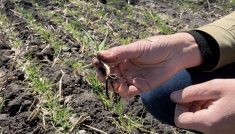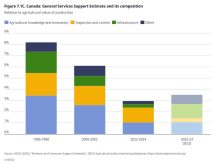Don’t expect any big changes in farm safety net programs after Canada’s federal-provincial agricultural policy agreement runs out in two years.
“More of the same,” is James Rude’s prediction for future business risk management (BRM) programs under a new Growing Forward framework.
Growing Forward with its so-called “suite” of BRMs – AgriStability, AgriInvest, AgriInsurance and AgriRecovery – expires March 31, 2013. A review of BRM programs currently underway will be key to their future under a new Growing Forward agreement, which Ottawa and the provinces must negotiate.
Read Also

Tie vote derails canola tariff compensation resolution at MCGA
Manitoba Canola Growers Association members were split on whether to push Ottawa for compensation for losses due to Chinese tariffs.
But Rude, an associate professor of agricultural economics at the University of Alberta, predicts the new BRMs will look pretty much like the present ones, despite complaints about them.
That’s because changing BRMs in a fundamental way is too hard, Rude said in a recent guest lecture at the University of Manitoba.
Rude, who teaches in the rural economy department, cited an old rule of economics that says you can’t achieve two objectives with only one instrument.
But that’s exactly the problem governments face when they sit down to hammer out farm programs, he said.
“There are too many competing demands and not enough instruments to deal with them.”
Farmers want “predictable and bankable” payments. They complain programs are too complex and slow to pay out. Governments worry about the effect of support programs on deficits, debt and international trade agreements. Economists say BRMs shouldn’t distort market signals or affect production. Provinces insist programs must deal with regional concerns instead of one size fits all.
As a result, nobody is happy with the way farm programs operate in Canada.
That’s not to say they don’t work. They do – to an extent, said Rude.
Programs to provide income support to Canadian farmers during times of depressed markets have been traditional since the 1958 Agricultural Stabilization Act. Successors include WGSA, tripartite, GRIP, NISA, AIDA, CAIS, CFIP and now AgriStability.
Their main purpose was to smooth out peaks and valleys in farm income which result from market fluctuations. Sometimes they succeeded.
Rude cited a 2007 University of Manitoba study which found the former CAIS program reduced Manitoba grain farmers’ short-term income variability by 32 per cent. In other words, CAIS lowered producers’ risk by nearly a third, thereby accomplishing its objective.
The problem is that safety nets only cut the bottom off the price cycle. They redistribute income. They do not deal with long-term market declines. If they did, they wouldn’t be financially viable, said Rude.
So the question is: what are stabilization programs for? Are they for smoothing out short-term income fluctuations? Or are they for dealing with chronically depressed prices?
They can’t do both at the same time. It comes back to the economic rule that one instrument cannot achieve multiple objectives. And that, Rude said, is the problem Canada’s farm stabilization programs have always had. Governments seek to stabilize income while producers want income support.
Unfortunately, that’s unlikely to change, given the incompatible demands, he said.
Later, Rude said if the federal government wants simply to transfer income, it might as well do so through direct producer payments.
That wouldn’t necessarily be trade distorting, as the government always fears, he added. The money would flow through the WTO green box of decoupled payments. They wouldn’t be linked to what farmers grow, so they wouldn’t distort market signals, he said. [email protected]
———
“Therearetoomany competingdemands.”
– james rude, u of a














